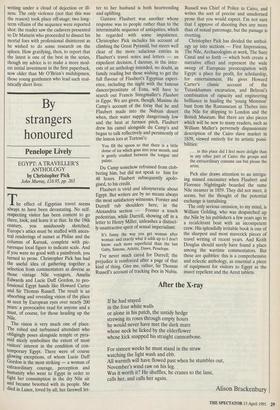By strangers honoured
Penelope Lively
EGYPT: A TRAVELLER'S ANTHOLOGY by Christopher Pick John Murray, £16.95, pp. 265 The effect of Egyptian travel seems always to have been devastating. No self- respecting visitor has been content to go there, look, and leave it at that. In the 19th century, you assiduously sketched; Europe's attics must be stuffed with ances- tral renderings of sunset at Philae and the columns of Karnak, complete with pic- turesque local figure to indicate scale. And if you were no good with a paintbrush, you turned to prose. Christopher Pick has had the useful idea of gathering together a selection from commentators as diverse as those vintage Nile voyagers, Amelia Edwards and Lucie Duff Gordon, to pro- fessional Egypt hands like Howard Carter and Sir Thomas Russell. The result is an absorbing and revealing vision of the place as seen by European eyes over nearly 200 years: a provocative read for anyone and a must, of course, for those heading up the Nile.
The vision is very much one of place. The robed and turbanned attendant who obligingly poses alongside temple or pyra- mid nicely symbolises the extent of most visitors' interest in the condition of con- temporary Egypt. There were of course glowing exceptions, of whom Lucie Duff Gordon is the most striking — a woman of extraordinary courage, perception and humanity who went to Egypt in order to fight her consumption in the dry Nile air and became besotted with its people. She died in Luxor, loved by all; her farewell let- ter to her husband is both heartrending and uplifting.
Gustave Flaubert was another whose response was to people rather than to the interminable sequence of antiquities, which he regarded with some impatience. Christopher Pick includes his account of climbing the Great Pyramid, but steers well clear of the more salacious entries in Flaubert's travel notes and letters — an expedient decision, I daresay, in the inter- ests of an anthology intended, no doubt, as family reading but those wishing to get the full flavour of Flaubert's Egyptian experi- ence, including the night with the famous dancer/prostitute of Esna, will have to search out Francis Steegmuller's Flaubert in Egypt. We are given, though, Maxime du Camp's account of the foray that he and Flaubert made into the Nubian desert when, their water supply dangerously low and the heat at furnace pitch, Flaubert drew his camel alongside du Camp's and began to talk reflectively and persistently of the lemon ices at Tortoni's:
You fill the spoon so that there is a little dome of ice which goes into your mouth, and is gently crushed between the tongue and palate.
Du Camp somehow refrained from clob- bering him, but did not speak to him for 48 hours. Flaubert subsequently apolo- gised, to his credit. Flaubert is vivid and idiosyncratic about Egypt. But writers are by no means always the most satisfactory witnesses. Forster and Durrell rub shoulders here, in the Alexandria section — Forster a touch pedestrian, while Durrell, showing off in a letter to Henry Miller, unleashes a distinct- ly unattractive spirit of sexual imperialism:
It's funny the way you get woman after woman: and exactly what it adds up to I don't know: each more superficial than the last Gaby, Simone, Arlette, Dawn, Penelope.
I've never much cared for Durrell; the prejudice is reinforced after a page of that kind of thing. Give me, rather, Sir Thomas Russell's account of tracking ibex in Nubia. Russell was Chief of Police in Cairo, and writes the sort of precise and unadorned prose that you would expect. I'm not sure that I approve of shooting ibex any more than of sexual patronage, but the passage is rivetting.
Christopher Pick has divided the anthol- ogy up into sections — First Impressions, The Nile, Archaeologists at work, The Suez Canal and so forth — which both create a narrative effect and represent the wide sweep of European preoccupation with Egypt: a place for profit, for scholarship, for entertainment. He gives Howard Carter's classic account of the Tutankhamun excavation, and Belzoni's combination of rapacity and_ engineering brilliance in hauling the 'young Memnon' bust from the Ramasseum at Thebes into the Nile for shipping to London and the British Museum. But there are also pieces which will be new to many readers, such as William Muller's perversely dispassionate description of the Cairo slave market in 1839, viewed entirely for its artistic possi- bilities: . . . in this place did I feel more delight than in any other part of Cairo: the groups and the extraordinary costume can but please the artist.
Pick also draws attention to an intrigu- ing missed encounter when Flaubert and Florence Nightingale boarded the same Nile steamer in 1859. They did not meet, it seems, but the thought of the potential exchange is tantalising.
The only serious omission, to my mind, is William Golding, who was despatched up the Nile by his publishers a few years ago in a recalcitrant boat with an incompetent crew. His splendidly irritable book is one of the sharpest and most maverick pieces of travel writing of recent years. And Keith Douglas should surely have found a place among the wartime commentators. But these are quibbles: this is a comprehensive and eclectic anthology, as essential a piece of equipment for visitors to Egypt as the insect repellent and the Arret tablets.


























































 Previous page
Previous page